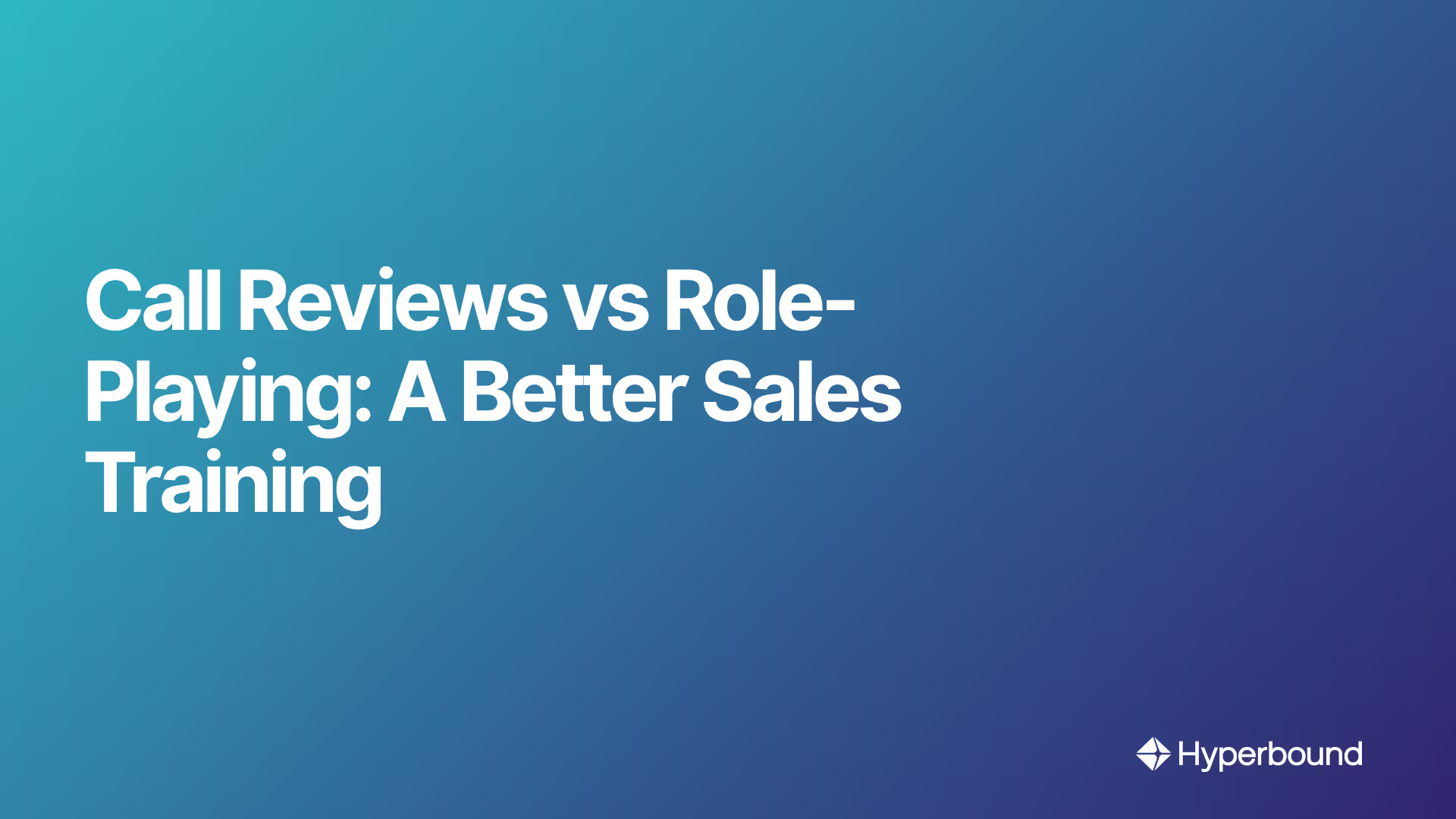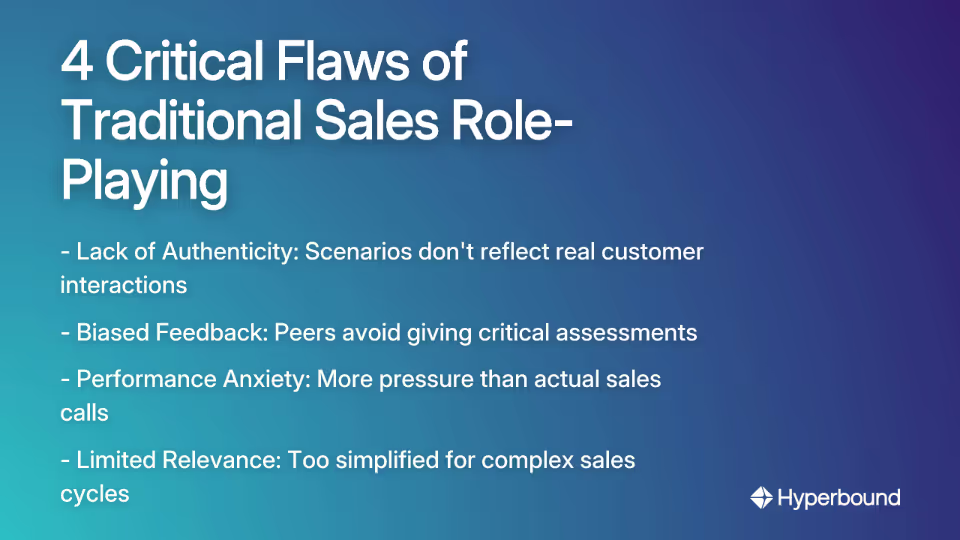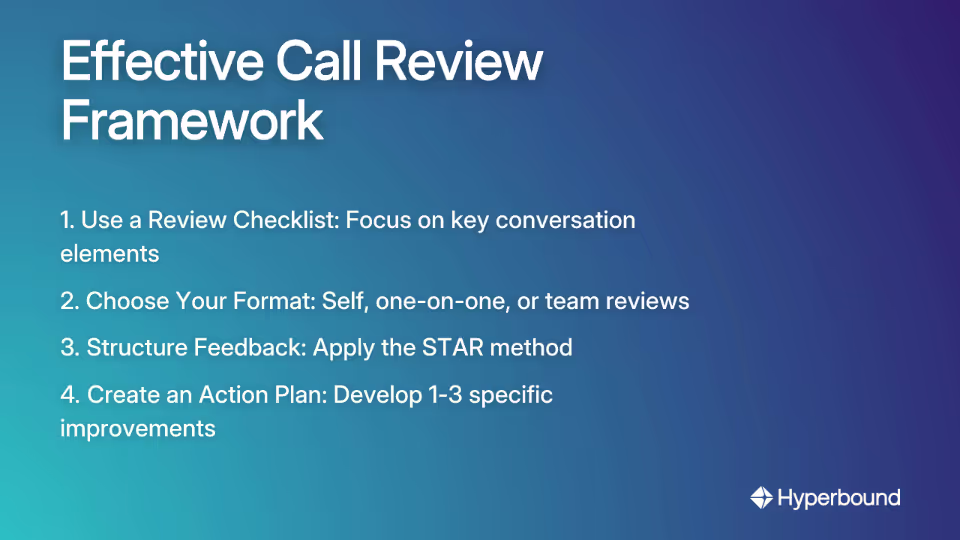
You've just wrapped up another awkward sales training session where you and your colleagues took turns pretending to be customers, throwing softball questions at each other while your manager watches. You felt your face flush as you stumbled through a scripted objection handling scenario that bore little resemblance to any real conversation you've ever had with a prospect.
Sound familiar? You're not alone.
Sales role-playing has been a cornerstone of sales training for decades, but many sales professionals find these exercises to be painfully inauthentic. As one experienced rep put it, "It's just so inorganic and resembles nothing of my real-life interactions with customers."
There's a better way to sharpen your sales skills: reviewing actual call recordings. This practice provides authentic learning opportunities that role-playing simply cannot match.
The Flaws of Make-Believe: Why Sales Role-Playing Falls Short
When you strip away the tradition, sales role-playing suffers from several fundamental problems:

Lack of Authenticity
Role-playing scenarios rarely capture the nuance and unpredictability of real customer interactions. One salesperson noted, "Nothing is genuine...you are not actually selling anything, nothing you say will actually sway the other person's mind." This fundamental disconnect means you're practicing for a reality that doesn't exist.
The person playing the customer either becomes unrealistically difficult or lobs easy questions your way. Neither prepares you for actual customer conversations where subtle cues and genuine emotional intelligence matter.
Biased, Ineffective Feedback
Peer-to-peer role-playing often results in skewed assessments. One sales professional shared this experience: "My last org decided it would be a great idea to pair everyone up and make us do a mock call and score each other. Almost every AE scored the other as perfect or near perfect."
When everyone's incentive is to be nice to their colleagues, the critical feedback necessary for improvement disappears.
Heightened Performance Anxiety
For many salespeople, role-playing creates more pressure than actual sales calls. "The role-playing is much more uncomfortable, probably because you know everyone in the room is judging your performance and knows every time you slip up or leave something out," explains one rep.
This performance anxiety shifts your focus from learning to simply trying not to embarrass yourself, defeating the purpose of the exercise.
Limited Scope and Relevance
While role-playing might benefit complete beginners in transactional sales environments, it quickly loses value for experienced professionals dealing with complex sales cycles. The simplified scenarios can't capture the intricacies of real-world sales conversations, making the practice increasingly irrelevant as you grow in your career.
The Power of Reality: Why Call Reviews Transform Sales Performance
In contrast to the theatrical nature of role-playing, reviewing real call recordings offers something far more valuable: reality.
Based on Genuine Interactions, Not Simulations
Call reviews analyze actual customer conversations—complete with real objections, unexpected turns, and authentic responses. You're not dissecting what might happen in a contrived setting; you're examining what actually occurred during a live demo or discovery call.
This foundation of truth provides concrete examples of what works and what doesn't in your specific selling context. Instead of practicing fake scenarios, you're learning from genuine interactions that directly apply to your next call.

Provides Specific, Objective Feedback
A structured call review assessment evaluates your performance against key criteria, providing objective insights into your strengths and weaknesses. Unlike the vague encouragement often exchanged during role-playing, call reviews can pinpoint exactly where and how you can improve.
Was your tone confident when discussing pricing? Did you effectively use open-ended questions during discovery? Did that new objection handling technique work? Call reviews answer these questions with evidence, not opinions.
Accelerates Growth Through Self-Awareness
Listening to your own calls is powerful for developing self-awareness. As one successful rep reflected, "If I could go back to when I first started selling and had the ability to listen to my calls, my growth curve would have been accelerated…only cheating yourself if you don't."
Call reviews help you find your authentic voice—something no amount of role-playing can accomplish. Even with excellent training, a sales manager noted, it "will still take them time to find their voice while speaking with customers." Call reviews accelerate this crucial process.
Drives Measurable Impact on Sales KPIs
Regular call reviews lead to tangible improvements in key performance indicators:
- Conversion Rates: More effective, coached conversations directly lead to higher close rates
- Quota Attainment: Consistent feedback keeps reps on track to meet targets
- Customer Satisfaction: Clear, confident, and helpful calls enhance the customer experience
How to Get Over the Cringe and Listen to Your Own Voice
Let's address the elephant in the room: most people hate listening to recordings of themselves. As one rep bluntly put it, "I HATE listening to my calls. Oh dear God it hurts my soul."
This discomfort is normal but overcoming it is essential for growth. Here's how to make the process less painful:
Acknowledge the Discomfort
Start by recognizing that almost everyone feels awkward when listening to their own voice. This isn't a reflection of your abilities as a salesperson—it's just human nature.
Shift Your Mindset
Instead of viewing call reviews as criticism, approach them as opportunities for growth. The goal isn't to judge yourself harshly but to discover specific ways to improve.
Think of each call as a game film that professional athletes review. They don't cringe at seeing themselves on screen; they look for opportunities to refine their technique.
Create a Supportive Environment
Leaders must champion a culture of continuous improvement rather than criticism. Call reviews shouldn't feel like scrutiny where managers are "looking for dirt to smear in someone's face." The process must feel safe and constructive.
Start with Self-Assessment
Review your own calls privately before sharing them with others. This builds confidence and gives you control over the process. Identify one thing you did well and one area for improvement before seeking outside feedback.
A Practical Framework for Effective Call Reviews
To maximize the value of call reviews, follow this structured approach:

Step 1: What to Look For (The Review Checklist)
Focus your analysis on these key elements:
- Tone of Voice: Is it enthusiastic, sincere, and clear?
- Rapport Building: How effectively did you connect with the prospect?
- Questioning Techniques: Did you use open-ended questions that uncovered valuable information?
- Product Knowledge: Did you convey information confidently and accurately?
- Objection Handling: How smoothly did you address concerns?
- Close Techniques: Did you clearly establish next steps or ask for the sale when appropriate?
Step 2: Choose Your Format
Call reviews can take several forms, each with distinct advantages:
Self-Reviews: Begin here to identify patterns in your communication style and sales approach.
One-on-One Reviews: Work with a manager or mentor for personalized coaching.
Team Reviews: These expose everyone to different approaches and provide broader feedback. One effective practice is to have reps "ask for 1 or 2 objections/hurdles from the past week that may have stumped them," and then review a call where that objection occurred.
Step 3: Structure the Feedback with the STAR Method
Keep feedback constructive and focused by using the STAR method:
- Situation: What was the context of the call?
- Task: What was your primary objective?
- Action: What specific steps did you take?
- Result: What was the outcome?
This framework ensures feedback addresses specific behaviors rather than making general criticisms.
Step 4: Create an Action Plan
End every review session with 1-3 clear, actionable takeaways. Small, consistent improvements lead to significant long-term growth. Schedule regular review sessions (weekly or bi-weekly) to build a rhythm of continuous improvement.
Leveraging Technology to Supercharge Your Reviews
Modern tools make call reviews more efficient and effective:
- AI Sales Coaching Platforms: All-in-one platforms like Hyperbound automatically record, transcribe, and analyze sales conversations. They provide a central library for calls, making them easy to search and review. Other tools in this category include Gong and Chorus.
- Automated Call Scoring & Feedback: Instead of relying on subjective peer reviews, AI tools provide objective, data-driven scoring against your specific sales methodology. This allows for time-stamped comments directly on call recordings, making feedback highly specific and actionable.
- AI-Powered Insights: Advanced solutions save reps and managers countless hours by automatically identifying key moments, talk-track adherence, and areas for improvement. This frees up time for more strategic coaching instead of manual review.
From Simulation to Reality: Making the Shift
Sales role-playing, with its artificial scenarios and unreliable feedback, is fundamentally flawed as a training tool. The path to real improvement lies in the authentic, data-rich world of call reviews.
Remember that growth takes time—even top performers need months to find their footing. One sales leader shared that it took their best rep "5-6 months to become confident enough, so later he became number 1 sales person in the whole company (150+ people)."
Had they relied solely on role-playing and immediate results, they would have missed out on developing a star performer.
By embracing call reviews, you're not just avoiding awkward office improv—you're systematically building the genuine skills that lead to sales success. The initial discomfort of listening to your own voice is a small price to pay for the authentic growth that follows.
Frequently Asked Questions
Why is reviewing sales calls better than role-playing?
Reviewing real sales calls is better than role-playing because it provides authentic, objective feedback based on actual customer interactions. Unlike the artificial scenarios in role-playing, call reviews allow you to analyze what truly happened, identify specific areas for improvement, and learn from genuine conversations that directly apply to your work.
What are the biggest flaws of traditional sales role-playing?
The biggest flaws of traditional sales role-playing are its lack of authenticity, biased feedback, the performance anxiety it creates, and its limited relevance for complex sales. Scenarios are often unrealistic, feedback from peers can be uncritical, and the pressure to perform for colleagues can inhibit genuine learning.
How do I get started with reviewing my own sales calls?
You can start reviewing your sales calls by following a simple framework: use a checklist to focus on key areas like tone and questioning, review calls by yourself initially to build confidence, use the STAR method to structure feedback, and create an action plan with 1-3 specific takeaways to work on.
What if I feel uncomfortable listening to recordings of my own voice?
It is completely normal to feel uncomfortable listening to your own voice; most people do. To overcome this, acknowledge the awkwardness, shift your mindset to view it as a growth opportunity (like an athlete reviewing game film), and start by assessing your calls privately before sharing them with a manager or team.
What should I focus on when reviewing a sales call?
When reviewing a sales call, you should focus on key elements of the conversation to ensure a structured analysis. A good checklist includes your tone of voice, rapport building, questioning techniques, product knowledge, how you handled objections, and the effectiveness of your closing techniques.
How can technology improve the call review process?
Technology, such as AI sales coaching platforms, can significantly improve the call review process by automating recording, transcription, and analysis. These tools provide a searchable call library, offer objective and automated scoring, and use AI to highlight key moments, saving significant time and providing data-driven insights for coaching.

Start today: Record your next call, listen with an open mind, and take one small step toward improvement. Your future sales results will thank you.
Book a demo with Hyperbound
.png)













